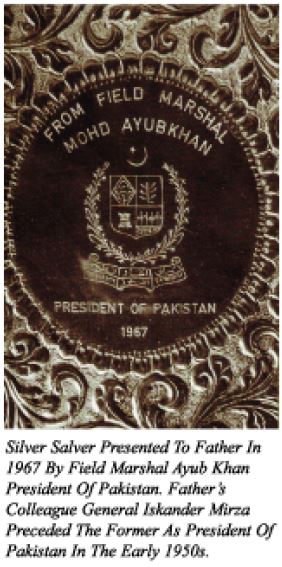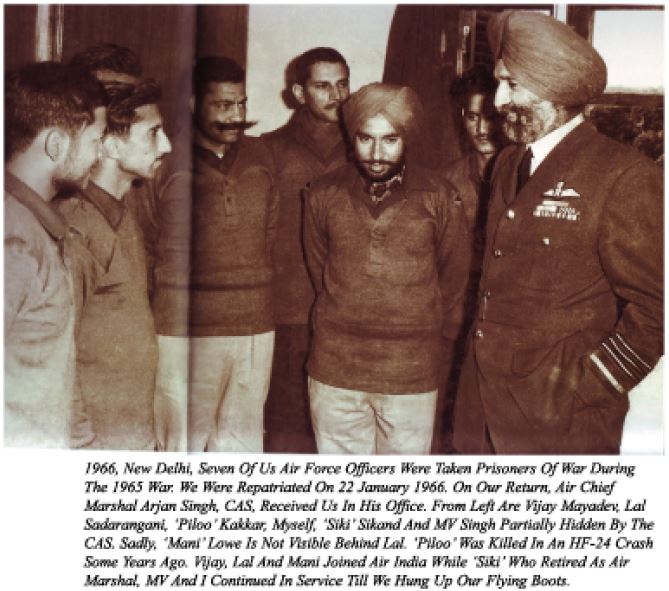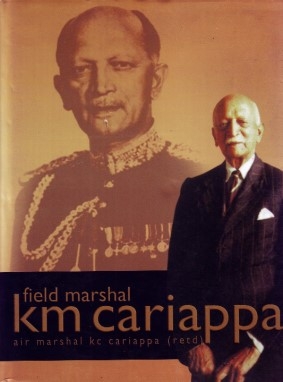In the years of his retirement Father took upon himself the role of conducting, as he put it. Self-appointed one-man goodwill missions to Pakistan to cement a better relationship than existed between the two countries at the time. He went to Pakistan entirely of his own accord and at his own expense. However, on each occasion he met the President and the Prime Minister before doing so, and on his return debriefed them about his deliberations. On one or two occasions he was accompanied by Mr CC Desai, the former High Commissioner to Pakistan.
This was the forerunner to today’s second-tier diplomacy! To this end, he banked heavily on his personal friendship with his erstwhile colleagues-in-arms and friends. President Iskander Mirza and President Ayub Khan, respectively. He and President Iskander Mirza had been young officers together in Waziristan in 1923.
Father visited Pakistan six times between 1958 and 1967 as their personal guest. During the years of Field Marshal Ayub Khan’s presidentship Father was able to speak to him, man-to-man. Their friendship first started in 1946 when they were in the North-West Frontier Province and Father was commanding the Bannu Brigade, with Col Ayub Khan as one of his battalion commanders. It was a relationship that endured despite the trauma of Partition. Ayub Khan agreed that the future of the subcontinent lay in the maintenance of peace and good neighborly relations. He stated that in his mind there was no other method whereby the two countries could save themselves from impending dangers.
During one particular trip Father proposed some possible solutions that he had discussed with President Ayub Khan for resolving the Kashmir impasse that he wrote of to Pandit Nehru: maintaining the status quo with each Nation keeping what it has and foregoing all talk about a plebiscite; leaving the Valley as an independent entity under the UN; handing over the entire State to Pakistan but keeping strategic heights to control the area; both countries walking out, ‘lock, stock and barrel’ and forming a loose confederation with Kashmir as a third party.
The second suggestion appeared to be the most widely acceptable to the then Pakistan Prime Minister Liaquat Ali Khan and the President. But, Pakistan wanted the Valley too. This was obviously unacceptable to India.
Father had expected a rocket from the Prime Minister questioning his right to make such suggestions. Instead, the reply he received suggested that the proposals could be worth considering. Father also discussed these with Sheikh Abdullah and other politicians most of whom appeared to favour the second option.
After a visit in April 1964, he told the Prime Minister that the President of Pakistan was willing to come to India to discuss all contentious matters, but had only to be invited to do so. Father said he had known Pandit Nehru for twenty years, had met him several times, but he had never known him so effusive in expressing his thanks. Pandit Nehru had said, ‘Thank you Cariappa for what you have done! Thank you! Thank you!’
Father had felt jubilant and delighted, and said to himself that at last they had a peg to hang a coat on. He had left with the distinct feeling that Pandit Nehru would do something about it.
Unfortunately, Pandit Nehru passed away soon thereafter.


Father had also mooted the idea of exchange of batches of students from schools and colleges. This he left would lead to better understanding, shed doubts and suspicion from which would emerge a new spirit of warmer relationship between the two countries.
In 1964 Father was invited by the President of the World’s veterans Federation (USA) to join them as a member and in that capacity visited Canada, the USA , Japan and China.
In September that year, he decided to visit East Pakistan to find out for himself the reason for the large-scale migration to India. He discussed this with the Prime Minister Shri Lal Bahadur Shastri and with the Home Minister Shri GL Nanda. He subsequently spent a week in Dhaka, discussed some possible solutions with the Governor and Chief Secretary and returned to give copies of his report to the Prime Minister, the Home Minister, and the Chief Minister of Bengal.
Due to the esteem in which Father was held, he was able to go wherever he wished, and talk to whomsoever he wanted in both wings of Pakistan. Every visit portended promise, but nothing fructified. His efforts were in vain. In April 1965, Pakistan initiated skirmishes in the Rann of Kutch, and later in August there were incursions into Jammu and Kashmir over which the two countries went to war on 1st September.
During that war I was flying missions out of Halwara and was shot down on 22nd September. I did not know it at the time, but it happened on the last day of the conflict. I ejected out of my aircraft and parachuted into a small area near Khem Karan in Punjab that had been occupied by Pakistan, and was taken Prisoner of War. Because of the personal bond between President Ayub Khan and Father, and announcement was made over Radio Pakistan for Father’s benefit that though I had been captured I was well. Within the hour the High Commissioner of Pakistan in Delhi is supposed to have spoken with Father who happened to be there at the time, with a message from his President. The President said that if Father so wished, I would be released forthwith, and reiterated that I was being well looked after. Father’s reply was typical of him; ‘They are all my sons, look after all of them’.
The Air Force Prisoners of War were repatriated on 22 January 1966. On arrival we were ushered into the office of the Chief of Air Staff, Air Chief Mshl Arjan Singh who welcomed us warmly.
Ten days later, I went home to Roshanara where Father said how happy he was to see me looking well.
I gathered from Nalini much later how distraught and concerned he was on receiving news of my capture. Of course, things were not made any easier for him with well-meaning people calling to express their sorrow on hearing the news. Throughout, however, he maintained the proverbial stiff upper lip.
After the ceasefire Father visited troops in their frontline locations. During one such visit he is said to have crossed into no-man’s land. The Pakistani Commander ordered him to stop, or he would be fired upon. From the Indian side someone shouted out that it was Gen Cariappa. Hearing this, weapons were lowered and the tension cased. There were smiles all around as the officer saluted Father who asked the Pakistani troops of they were well and whether they had received mail from home!!

